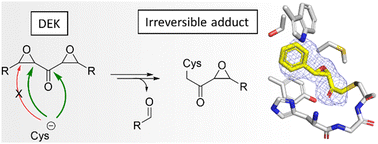Chem. Commun., 2023, Advance Article
DOI: 10.1039/D3CC02932H, Communication
DOI: 10.1039/D3CC02932H, Communication
 Open Access
Open Access This article is licensed under a Creative Commons Attribution 3.0 Unported Licence.
This article is licensed under a Creative Commons Attribution 3.0 Unported Licence.Mariska de Munnik, Jasper Lithgow, Lennart Brewitz, Kirsten E. Christensen, Robert H. Bates, Beatriz Rodriguez-Miquel, Christopher J. Schofield
αβ,α′β′-Diepoxyketones (DEKs) inhibit nucleophilic cysteine enzymes. DEKs react with a transpeptidase and the SARS-CoV-2 main protease via epoxide opening; retro-aldol and other reactions can then occur, enabling irreversible alkylation.
To cite this article before page numbers are assigned, use the DOI form of citation above.
The content of this RSS Feed (c) The Royal Society of Chemistry
αβ,α′β′-Diepoxyketones (DEKs) inhibit nucleophilic cysteine enzymes. DEKs react with a transpeptidase and the SARS-CoV-2 main protease via epoxide opening; retro-aldol and other reactions can then occur, enabling irreversible alkylation.
To cite this article before page numbers are assigned, use the DOI form of citation above.
The content of this RSS Feed (c) The Royal Society of Chemistry

